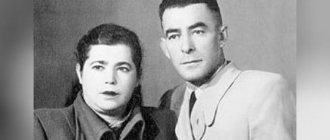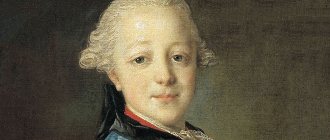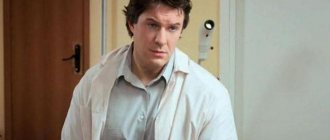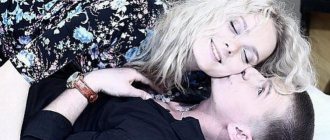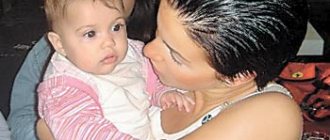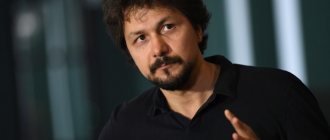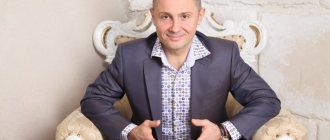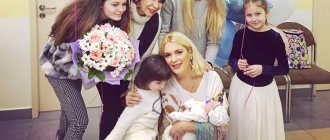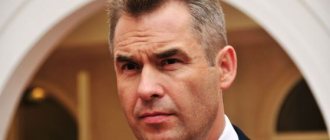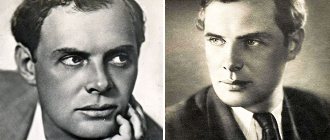Childhood and youth
Pavel was born in the summer of 1976 in Odessa, Ukraine, and 3 years later he moved with his parents to Moscow for permanent residence. The son of Roman Kartsev was raised not only by a creative father, his mother Victoria Kassinskaya was a corps de ballet dancer in her youth, they met in Odessa, and 3 years later they got married in Leningrad.
Pavel Kassinsky as a child (still from the film “My Husband is an Alien”)
The first daughter in the family was Elena, and then the younger Pavel. At a family meeting, the parents decided that both children would bear their mother’s surname, since the father’s real surname Katz (Kartsev is the actor’s pseudonym) would raise questions among others.
Pavel began to take his first steps in his cinematic career during his school years. It was then that the first shootings in the children's humor magazine “Yeralash” appeared in his biography. The aspiring actor appeared in 8 episodes of the entertainment program.
Pavel Kassinsky: “My father remained a mystery to everyone”
Caravan of StoriesCelebrities
Recorded by Irina Mayorova
Photo: N. Galkin/7 days
Dad was at school only once, when the question of my expulsion arose and the director demanded “namely Roman Andreevich,” apparently believing that he had more influence on his son. I remember that visit very well: the director takes my father on a tour of the school, followed by a procession of aunts - teachers, methodologists. Kartsev turns his head and looks like a hamster that, not fully awakened, was pulled out of the hole. Extreme bewilderment is visible on the face: “Where did I end up? What am I doing here? Who are all these people?"
Returning home after school, I found my father lying on the sofa with a stack of sheets in his hands - he was learning another text. He looked up at me:
- How are you?
- Fine.
- Well, good.
Neither the notation “how did you come to live like this”, nor the statement “They left you, but this is the last time - think about where you will go when they kick you out.” It seems that he has already forgotten that he was at school this morning...
And the first childhood memories associated with my father are walks around Odessa. For my sister and I, they were a holiday because they happened rarely. Eight months a year, dad was on tour, and at home in Moscow or visiting his mother-in-law in Odessa, he learned the texts of new miniatures and plays. There are no plots in those old memories, only pictures: dad buys Lena and me ice cream, takes me in his arms so that he can reach the “candles” of the blooming chestnut tree and smell the smell.
The first full-fledged story dates back to the early eighties - I was five or six, and the legendary forward Oleg Blokhin appears there. But before I tell you, a little biographical information. My paternal grandfather’s name was Anshel Zelmanovich Kats, so according to my passport my dad is Roman Anshelevich Kats. He became Kartsev with the light hand of Arkady Raikin, to whom the “family” surname seemed too short, and the real patronymic was transformed into “Andreevich” by itself - for simplicity and ease of remembering.
Before World War II, my grandfather was a famous football player in Odessa, but after being wounded at the front, after the Victory he could only work as a coach and referee. Until the end of his life, football remained his main passion, which Anshel Katz passed on to his son. The head of the house, Sura-Leya Ruvinovna Fuksman (as in most Jewish families, the Kats’ wife was in charge), did not like the hobby of both of them too much, but had to put up with it.
Unfortunately, my dad’s parents died before I was born and I only know about them from stories. My grandmother, whom everyone called Sonya, worked as a quality control inspector at a shoe factory and was elected secretary of the party organization for many years. With his communist wife, my grandfather managed to dissent. In the evenings I listened to the Voice of America, and then, under the covers, told Sonya the news from the “enemy radio.” And she shared the latest party directives and the contents of the closed letters of the Central Committee discussed at the district committee bureau. Often such an exchange of information turned into a heated discussion in a raised voice or even into a battle. Since the family lived in the same room, dad heard everything behind his screen and died laughing.
In adulthood, a passionate fan Roman Kartsev considered being forced to miss a match with the participation of Dynamo Kyiv or Chernomorets Odessa almost a tragedy. I personally knew every player on both teams, and was friends with some.
...So, Odessa, summer. I live with my grandmother, my mother's mother. One after another, Dad, Ilchenko and Zhvanetsky come to the city for a short vacation. And Dynamo (Kyiv) arrives in full force at one of the best training bases in the USSR, which is located in the Odessa suburbs. My father’s good friend, striker Oleg Blokhin, suggests: “Take Vitya, Misha, and come to the base, let’s play football.”
Dad took me with him too. I’m fussing, little one, near the goal - it seems like one of the defenders, at some point I turn my head and see how the ball thrown by Blokhin is flying straight at it. The blow was so strong that I fell and burst into tears - from pain and resentment. All the players, including Oleg Vladimirovich, rushed to me - they looked at the place where the ball hit, felt sorry for me, and reassured me. But I don’t remember my father among the comforters. Either he was very frightened, or, on the contrary, he was angry that I was roaring.
Another story that happened in Odessa, where the main characters were the father, Ilchenko and Zhvanetsky, dates back to the early nineties. We arrived at Humorina and checked into the Londonskaya Hotel. Michal Mikhalych’s proposal “Let’s go for a walk” was frivolously accepted. Before they had time to take even a dozen steps, a crowd formed around them - questions, declarations of love, stories about mutual friends and acquaintances began to pour in. So they walked along the streets and boulevards with a huge escort. We reached Privoz, where merchants gave away the first spring greens, homemade sausage, dried and smoked fish for free. They returned to the hotel, hung with packages, after dark, accompanied by a much larger crowd. With conversations, jokes, laughter. For me, this walk will forever remain evidence of true people's love.
Lena and I didn’t have a father who could, sitting opposite us, suggest: “Let’s talk about your future - what do you want to become?” Or cry out: “I know you can! Do It! Break them all!” I don’t even remember a time when he raised his voice or scolded me for something. Our upbringing was completely left up to our mother, and if my sister didn’t cause much trouble, then I spoiled a lot of blood. I won’t say that I was such a notorious hooligan, but I didn’t want to study. Most subjects seemed boring, even literature, although I had been reading voraciously since early childhood. It’s just that my choice of authors did not coincide with the school curriculum: I preferred Zoshchenko, Averchenko, Babel, Sholom Aleichem, Kharms to Pushkin and Tolstoy. I was scolded at every parent meeting, the head teacher and teachers constantly called my mother for serious conversations, after which I got a lot of trouble with the wicker handles of my nylon string bag.
Photo: from the archive of P. Kassinsky
When asked:
— How did your father feel about your roles in Yeralash? Did you praise? Did you support? — I answer completely sincerely:
“I’m not sure he saw me in at least one of the episodes.” In any case, there was never a conversation about this between us.
People are surprised and don’t believe:
- How can this be?
I shrug:
“It turns out, maybe, there’s no need to explain to everyone that my father was a completely separate person, to whom generally accepted norms do not apply, and the logic of certain actions is often incomprehensible even to those close to him, and perhaps even to himself.”
For a long time no one in Yeralash knew that I was the son of Roman Kartsev. One day a man approached me on the street, said he was from a film magazine, gave me a business card and asked me to call to find out the date and time of the casting. Then candidates were selected for the release, which was released under the title “Guessing Game”. The plot is this: a robot was installed in the cinema lobby, giving out complete information about the person standing in front of it. And the main character, named Fedya Vasechkin, tries to deceive him, masquerading as an old man, a black man, and even a girl. The assistants of screenwriter and director Vladimir Alenikov were looking for a certain type, and I was among the chosen ones. A couple of days later, accompanied by his mother (who, by the way, was completely casual about her son’s prospect of starring in the super-popular “Jumble”), he went to the Gorky Film Studio, where the auditions took place, and passed a competition among fifty candidates. I had no fear of the public or the camera, because from the age of four I went on stage during my father’s “leftist” concerts and read poetry while he, sweating terribly during performances, changed his clothes backstage. I also constantly watched his work during cruises on ocean liners, where artists of various genres with their wives and children (up to a certain age) were invited to full allowance - so that in twenty-four days they would give two concerts: one - in front of passengers, the second - for the team.
In addition to “Guessing Game,” I starred in several more episodes of “Jumble”: “I Don’t Believe!”, where I played a stubborn skeptic spectator at a magician’s performance; “The Deal,” where my hero pushes his friend an advanced wristwatch with batteries in two heavy suitcases; "Let's argue!" - eating dozens of eclairs; “Inventor” - with an “anti-gravity lift” in the shape of a rat. In two or three more he played supporting characters. I was lucky that I immediately got to work with Alenikov, with whom filming was easy and fun, and considering that I could skip school on completely legal grounds, it was generally happiness. The author of the famous children's films about Petrov and Vasechkin wanted to make a sequel, and since the performers of the main roles had grown up, he was looking for a replacement for them - that’s why in “Guessing Game” I appear under the name Vasechkin.
A big movie prevented the idea from being realized: in the late eighties, Vladimir Mikhailovich shot the musical film “The Binder and the King”, the location of which was the famous Odessa Moldavanka, and the main characters were played by Armen Dzhigarkhanyan, Andrey Urgant, Maxim Leonidov, Irina Rozanova, Zinovy Gerdt, Evgeny Evstigneev , Roman Kartsev. The director, without testing, approved the father for the role of Lazar Boyarsky, the fiancé of Benya Krik’s sister Dvoira, who was brilliantly played by Tatyana Vasilyeva. I’m sure that anyone who has ever seen the film will immediately remember the episode where dad’s hero sings the song “Nerves, Nerves, Nerves,” while doing incredible dance moves.
Photo: film studio named after. Gorky
I believe that no one has made a better film about Odessa, either before or since. It contains the true spirit, flavor and language of the city, which has always stood apart. Neither the series about Mishka Yaponchik, nor even more so “Liquidation” can hold a candle to Alenikov’s film, everything in them is pretentious and artificial: situations, characters, dialect.
My father starred in a dozen and a half films, but he considered Lazar Boyarsky to be the most successful role. About Shvonder in Bortko’s film “Heart of a Dog,” he said: “It was easy for me to play him - I’ve been on stage for so many years in the image of such idiots. Unfortunately, both Shvonders and Sharikovs are indestructible in our lives.” About Yos in “Old Nags” he recalled that “it was interesting to get into the skin of an elderly Jew in love.” The second number in his personal rating was the role of the tailor Misha Perelmuter in the film by the same Vladimir Alenikov “The Smile of God, or a Pure Odessa Story.” Unfortunately, one of my father’s last paintings was underestimated by both critics and viewers.
Photo: Lenfilm/still from the film “Heart of a Dog”
However, I’ll return to “Bindyuzhnik...”. In 1990, it was shown in the homeland of musicals - in Los Angeles at the film festival, where the film was a wild success. The director was invited to Hollywood and immediately signed a contract with him for the film “Time of Darkness,” which was released in our box office under the title “Feofania Painting Death.” For the next few years, in parallel with the filming of documentaries and short films, Vladimir Mikhailovich was a professor at Los Angeles University and taught directing at a film school. So, because of “The Bandit and the King,” I did not take part in the new adventures of Petrov and Vasechkin...
Photo: from the archive of P. Kassinsky
It seems that it was on the set of the musical film that Alenikov learned that he had already dealt with one of the members of the Katsev-Kassinsky family, that is, with me. Vladimir Mikhailovich was amazed that I never mentioned my famous parent.
It’s probably worth explaining why my sister and I bear our mother’s last name. It’s simple - parents did not risk registering their children as Elena Katz and Pavel Katz in the registry office in a country where anti-Semitism had triumphed.
I recently met a guy I know who, in an effort to break into the profession, changed his last name in his passport to his father’s acting pseudonym. I didn’t say anything to him, but thought to myself: “Do you hope that after this daddy’s talent will descend on you? In vain."
I can respect myself for the fact that even in adult life, when I decided to become an actor, I did not speculate on my father’s name. Even for admission to “Pike” he asked for help to prepare not for him, but for the artistic director of the Hermitage Theater, Mikhail Levitin, in whose troupe Roman Kartsev and Viktor Ilchenko then played. However, I did throw a fishing rod to my parent once:
- Dad, I want to go to theater.
He looked up from the text:
- Do you need it? - and again buried himself in the sheet of paper with the role.
I still don’t know what was behind this reaction. Maybe he didn’t see in me a fanatical desire to become an actor and nothing else, or maybe he didn’t want to repeat his sad and, to some extent, humiliating experience - my father entered the acting department of GITIS only on the seventh attempt.
Photo: E. Sukhova/7 days
I approached the creative tests at the Shchukin School with a solid baggage: a large number of poems, two dozen fables by Aesop, Marshak, Krylov, Mikhalkov, excerpts from the prose of Zoshchenko, Chekhov, Kharms, Sholom Aleichem. When, having completed two rounds, I appeared at the competition before the rector of Shchuka, Etush, and he asked what I wanted to read, I answered:
“Choose from the list...” and he sprinkled and sprinkled with names.
Vladimir Abramovich's eyebrows rose to his hairline:
- This is the repertoire!.. Well, young man, let’s do something at our own discretion.
The selection committee of the stars of the Vakhtangov Theater listened attentively and kindly, and Etush, after the end of the competition, himself came up in the corridor: “I’m not taking you, but only because there’s nothing to teach you. You are an accomplished artist - go to castings, show yourself to different directors, someone will definitely pay attention and invite you to a play or film.”
At home, I relayed Etush’s review to my mother with great enthusiasm. She frowned: “Acting is not a profession. Today you are on stage covered in bouquets, and tomorrow you will be forgotten. If you don’t become popular or even deserved, even an acting retirement home won’t shine. A man must have a profession that will always be in demand. You must be able to do something with your hands - and do it well! I seem to have two children, but in reality—here she pointed toward my father’s favorite sofa—three. I’m like a single mother with many children - I screw in the light bulbs myself, hammer the nails myself, saw, plan, cut the grass and lay the tiles...”
Movies
Since the beginning of the 2000s, Pavel has become in demand as a film actor, although he played only small roles, most often they were negative characters. In the series “The Return of Mukhtar” he played a bandit with a scar on his face, and in “The Knockout Game” he appeared as a policeman in a cordon. The audience remembered him more for his work in Sergei Arlanov’s comedy “Soldiers,” where he played Sergeant Ryleev, nicknamed Rylo.
Pavel Kassinsky (still from the series “Interns”)
Among Kassinsky’s other notable works, TV viewers note the filming of the films “And Still I Love...”, “House of Exemplary Maintenance”, “Amazons”, “SashaTanya” and “The Abduction of Eve”. Fans liked the image of the man no less in one episode of “Interns,” where Pavel played the role of a “criminal” patient who arrived for treatment. In a T-shirt, with a clean-shaven head and tattoos on his arms, he looked very harmonious.
It is worth noting that due to his appearance and physique (height 171 cm, weight 74 kg), Kassinsky most often gets rude characters, criminals, bandits and other dangerous elements. Every time he perfectly gets used to the role and delights the audience with his performance in films of different genres.
Denis Buzin
Before filming “Soldiers,” this actor appeared only in the film “Mustang.” Therefore, the role of Private Butonov can be considered his first serious film work. After the release of the television series, directors began to take an interest in him and invited him to participate in the creation of “The Law of the Stone Jungle,” “ChOP,” “Capercaillie” and “Fizruk.”
Russian nobles did not work, but where did they get the money and what did they spend it on?
Only the young will understand. Nikita Presnyakov explained why not everyone loves his music
Ksenia Katalymova said that “Peace, Friendship, Chewing Gum” is a special series for her
Pavel Kassinsky now
Pavel still acts in films, although now he appears on screens less often. In March 2020, the 3rd season of the series “Secret City” started, where Pavel got the role of Hoof (in the previous two seasons the man played the same character). This is a fantasy film that tells a fictional story with non-existent characters.
Pavel Kassinsky (still from the series “The Secret City”)
Fans hope that Pavel will appear on screens more often and will delight them more than once with his acting in various films.
Igor Gasparyan
The guy who played Socrates Poghosyan trained in Greco-Roman wrestling until he was 20 years old and even managed to become a silver medalist at the Ukrainian Championship. In 2001, Igor moved to Moscow, where he worked as a janitor and loader for a couple of years. In 2003, he got a job at Mosfilm and began acting in films. To date, Gasparyan’s filmography includes about 90 films, some of which he got episodic roles.
Mariana Arias is known for her role in “Wild Angel”: what she looks like today
Homemade cured bacon. Grandma gave me a recipe for a delicious hearty dish
Men believe that masks are a sign of weakness: they take risks and take them off
Roman Kartsev's son Pavel decided to become a pharmacist
Having received a pharmacist diploma, Pavel Kartsev, however, did not become a pharmacist - he began to engage in PR. But the creative soul urgently asked for a way out, which consequently gave impetus to return to the stage and filming. Pavel triumphantly performed together with his father in a performance based on the works of D. Kharms, and in addition starred in two marketing videos for Nuts chocolate, creating the image of Stomach.
In the Nuts videos, Pavel performed half-dressed, showing the multiple tattoos that he actually has. He admits: “From an early age, body painting seemed attractive to me, although my father and mother still cannot come to terms with them. My dad, artist and comedian Roman Kartsev, doesn’t say anything about this question, but my mother compares me with a prisoner...” Pavel Kartsev gained widespread popularity from the television series “Soldiers,” released in 2004, where he turned into soldier Ryleev, nicknamed “Snout.” And despite the fact that he did not have to serve in the real army, the image came out very vivid and undeniable.
